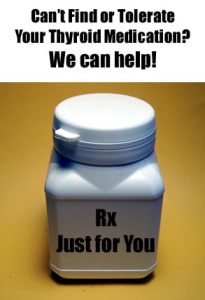Adrenal and Thyroid Conditions
Can’t find your thyroid medicine?
We offer compounding, or custom medicines, for Adrenal and Thyroid Conditions
When commercially unavailable, various forms and strengths of Natural Thyroid can be compounded. In addition, we can blend T4 and T3 pure powders in a specific ratio by prescription. Ask us for more information.
Thyroid Medicine Not Agreeing With You?
Many commonly-available medications for adrenal and thyroid issues contain ingredients that are not tolerated by everyone. We can make an effective medicine just for you. Ask your physician to contact us today!

For Physicians
Commercially available tablets contain fillers and excipients that may not be tolerated by all patients. When we compound customized dosages, we have the ability to omit any problem-causing inactive ingredients and substitute non-reactive fillers. We welcome your questions and the opportunity to help your patients.
Adrenal Fatigue: The adrenal glands secrete hormones such as cortisol, estrogen, and testosterone that are essential to health and vitality and significantly affect total body function. After mid-life, the adrenal glands gradually become the major endogenous source of sex hormones in both men and women. Intense or prolonged physical or emotional stress commonly associated with modern lifestyles or chronic illness can lead to Adrenal Fatigue, which is an important contributing factor in health conditions ranging from allergies to obesity. Stress may be either acute or chronic. The adrenal glands are involved with both types. The adrenal glands are small structures located above each kidney. The internal part is called the adrenal medulla. It secretes adrenaline in response to acute stress and prepares the body for fight or flight.
Diseases such as rheumatoid arthritis, other autoimmune disorders, ulcerative colitis, Crohn’s Disease, hay fever, asthma and many others are made worse when mild adrenal insufficiency is present and may be helped by correcting this condition. Mild adrenal insufficiency is aggravated by, but also contributes to, a person’s abuse of substances, such as alcohol, tobacco, caffeine, recreational drugs, sugar, and artificial sweeteners.
Anti-inflammatory and anti-oxidant adrenal hormones like cortisol help to minimize allergic and negative reactions, such as cancer and autoimmune disorders. These hormones closely affect the utilization of carbohydrates and fats, the conversion of fats and proteins into energy, and cardiovascular and gastrointestinal function.
How can relative adrenal cortical insufficiency be treated? First, whenever possible, we correct underlying causes, such as infections, toxic exposures, poor nutrition, and psychosocial stresses. Next, the adrenals should be nourished. This can be done with nutritional support using specific supplements. The most important supplements for adrenal support are: vitamin C, pantothenic acid, vitamin B6, manganese, magnesium, and raw adrenal tissue. Proper adrenal support is essential to complete the hormonal pathway to optimal health, and includes proper nutrition, getting plenty of sleep, regular moderate exercise, stress management, slowing down to regain a proper perspective on life, and replacement of deficient hormones.
Thyroid Hormone Therapy
Symptoms of hypothyroidism (low levels of thyroid hormone) include fatigue, cold and heat intolerance, hypotension, fluid retention, dry skin and/or hair, constipation, headaches, low sexual desire, infertility, irregular menstrual periods, aching muscles and joints, depression, anxiety, slowed metabolism and decreased heart rate, memory impairment, enlarged tongue, deep voice, swollen neck, PMS, weight gain, hypoglycemia, and high cholesterol and triglycerides. Yet, more than half of all people with thyroid disease are unaware of their condition.
Although both T4 (thyroxine, an inactive form that is converted to T3 in other areas of the body) and T3 (triiodothyronine, the active form) are secreted by the normal thyroid gland, many hypothyroid patients are treated only with levothyroxine (synthetic T4). Some hypothyroid patients remain symptomatic, and T3 may also be required for optimal thyroid replacement therapy. However, the only commercially available form of T3 is synthetic liothyronine sodium in an immediate release formulation which is rapidly absorbed, and may result in higher than normal T3 concentrations throughout the body causing serious side effects, including heart palpitations. Research indicates there is a need for sustained-release T3 preparations in order to avoid adverse effects.
A randomized, double-blind, crossover study found inclusion of T3 in thyroid hormone replacement improved cognitive performance, mood, physical status, and neuropsychological function in hypothyroid patients. Two-thirds of patients preferred T4 plus T3, and tended to be less depressed than after treatment with T4 alone. Patients and their physicians may wish to consider the use of sustained-release T3 in the treatment of hypothyroidism, particularly when the response to levothyroxine (T4) has not been complete.
J Endocrinol Invest 2002 Feb;25(2):106-9 :Levothyroxine therapy and serum free thyroxine and free triiodothyronine concentrations. Click here to access the PubMed abstract of this article
N Engl J Med 1999 Feb 11;340(6):424-9 Effects of thyroxine as compared with thyroxine plus triiodothyronine in patients with hypothyroidism. Click here to access the PubMed abstract of this article. Also, the FREE full text of this article is available online.


